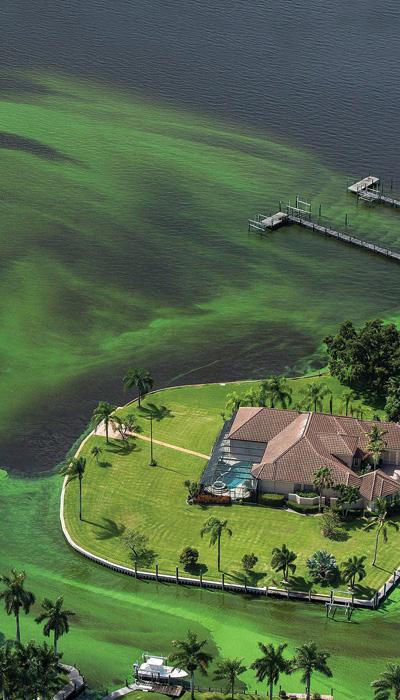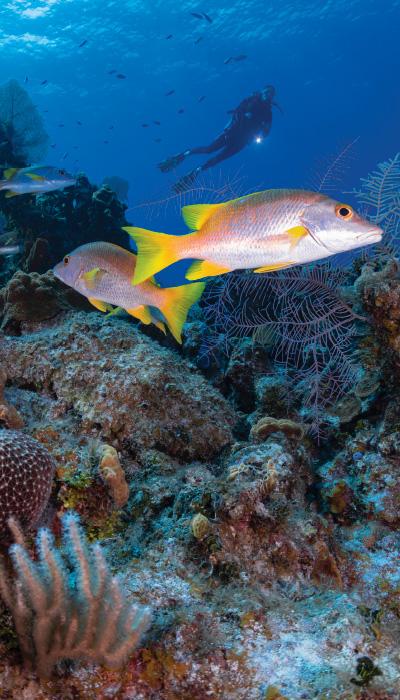Ocean Health: Human Health
Sustaining Our Seas
 The ocean is teeming with life that has potential to unlock cures and treatments to some of the most devastating diseases facing humankind. Marine biomedical and biotechnology research is a hallmark of FAU Harbor Branch with ongoing federal funding and an international reputation. Our scientists closely examine natural chemicals and compounds derived from animals and plants found in and around coral reefs, resulting in promising drugs and therapeutics for the future. While the aquatic environment is a source for cures, it can also be a source for illness. There is not yet a full understanding of how changing environmental conditions and Harmful Algal Blooms (HABs) affect ecosystems and human health. FAU Harbor Branch conducts research spanning the issue, assessing the true risks.
The ocean is teeming with life that has potential to unlock cures and treatments to some of the most devastating diseases facing humankind. Marine biomedical and biotechnology research is a hallmark of FAU Harbor Branch with ongoing federal funding and an international reputation. Our scientists closely examine natural chemicals and compounds derived from animals and plants found in and around coral reefs, resulting in promising drugs and therapeutics for the future. While the aquatic environment is a source for cures, it can also be a source for illness. There is not yet a full understanding of how changing environmental conditions and Harmful Algal Blooms (HABs) affect ecosystems and human health. FAU Harbor Branch conducts research spanning the issue, assessing the true risks.
To improve human health, we must protect ocean health. Since 1984, Florida Atlantic University Harbor Branch’s Marine Biomedical and Biotechnology Research (MBBR) program researchers have closely examined natural chemicals from deep sea corals and sponges, as well as the microorganisms that live within them, for treatments to antibiotic resistant infections and aggressive cancers. The promising drugs and therapeutics identified through this important work have led to international recognition of the FAU Harbor Branch MBBR program and its premier specimen collections.
While the aquatic environment is a source for cures, it can also be a source for illness. There is not yet a full understanding of how changing environmental conditions, pollution (e.g., nutrients and plastics) and events like harmful algal blooms (HABs) affect ecosystems and human health.
The ocean is teeming with life that has potential to unlock cures and treatments to some of the most devastating diseases facing humankind. Having access to state-of-the-art tools allows us to explore the sea for potential cancer cures.”
FAU Harbor Branch
Research Professor
The Issue
For centuries, people have looked to nature to develop cures to some of the most devastating diseases facing humankind. It’s imperative that we not only continue exploring potential cures, but also protect these species and ecosystems, and with them, the potential cure for multiple cancers, before they are lost.
Today, nearly 70% of the pharmaceuticals on the market were derived from natural products, and most marine natural products have been discovered by studying sea sponges.
People have only investigated a small fraction of the nearly 9,000 described species of sponges for their therapeutic potential, which means we have yet to discover many potential medicines beneath the waves.
- 15,000 waterbodies in the U.S. have nutrient-related problems
- 50 out of 50 states are impacted by nutrient pollution
- Reported drinking water violations for nitrates have nearly doubled in the last decade
- Only a small fraction of the nearly 9,000 sponges have been investigated
- Many of the pharmaceuticals on the market are derived from sea sponges
 FAU Harbor Branch Taking Action
FAU Harbor Branch Taking Action
FAU Harbor Branch’s work combines years of expertise to address two prominent issues: understanding the threats of declining environmental conditions to human health and discovering and safeguarding potential therapeutics from the oceans.
Discovering and Safeguarding Potential Cures
FAU Harbor Branch’s researchers collect unusual marine organisms—many of them from deep-water habitats—that are the source of novel natural products. We focus on marine plants, invertebrates and the microorganisms that live in association with them. Our drug discovery program primarily looks for treatments for cancer and infectious diseases, but we also collaborate with scientists working on malaria, tuberculosis, neurodegenerative disease and inflammation. Additionally, we look for compounds to combat antibacterial resistance, one of the most pressing problems for future generations.
Understanding Threats of Declining Environmental Conditions to Human Health
FAU Harbor Branch established the Florida Center for Coastal and Human Health (FCCHH) to fulfill an unmet scientific need to increase knowledge of HABs and other toxins and pollutants in our environment, with the goal of improved mitigation and informed policy. The FCCHH combines leading expertise and multidisciplinary research to take on this complex problem. Scientists are trying to understand the dynamics that lead to degraded water quality from events like HABs by profiling the algal chemicals present during blooms to determine how they are produced and to assess their toxicity. Their research also focuses on how toxic compounds transfer throughout coastal food webs to affect large animals, like sharks, rays and sea turtles, and ultimately have direct impacts on human health.
Decades of rapid population growth, the loss of natural areas and altered water flows have caused documented ecological shifts across the state. Our coastal regions face challenges like warming temperatures, rising sea levels and the increasing occurrence of Harmful Algal Blooms (HABs) and other significant health threats. HABs can impact the health of people who breathe air near, consume seafood, work and recreate in waters from affected areas. According to the United States EPA:
- 50 out of 50 states are impacted by nutrient pollution
- States have identified about 15,000 waterbodies in the United States with nutrient-related problems
- Reported drinking water violations for nitrates have nearly doubled in the last decade
Our Outcomes
- Continue to test and discover drugs to treat cancer and other illnesses, as well as combat antibiotic resistance
- Increase our knowledge of toxic algal blooms, with the goal of mitigation and informing policy
The more research we do, the better our understanding of cancer, which increases our chances of finding new ways to treat cancer.”
FAU Harbor Branch
Associate Research Professor
Why Give Today?
Florida Atlantic University (FAU) Harbor Branch Oceanographic Institute is rapidly evolving. Now is the time to expand our impact through private philanthropic support. The Institute is increasing its funding to core programs that will make a significant and timely impact on critical ocean issues in Florida and beyond. FAU Harbor Branch has strong partnerships with government officials, the Department of Defense and leading research institutions around the world. These key connections and partnerships ensure that we inform decision makers about science and how to ultimately mitigate impacts to the ocean and coastal environment.
How You Can Help
With your help, we can tackle one of the most pressing problems for our future—preserving fragile ecosystems and wildlife. With your support, we can further our research efforts to advance our knowledge of wildlife and their threats, as well as develop new methods and technologies for research.
Thank you for considering supporting this critical research area. FAU Harbor Branch values our donors as key partners in helping to achieve our vision: “Ocean Science for a Better World.®”
In the not too distant future—if not already—the majority of bacterial diseases will no longer be treated by the antibiotics that exist at the moment. Finding new treatments is imperative.”
FAU Harbor Branch
Research Professor
